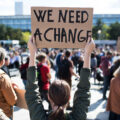Denmark – taking a turn towards Christianity?
Denmark – taking a turn towards Christianity?
In the midst of the Danish Folk Party’s biggest voter crisis in history, the party’s new vice-chairman Morten Messerschmidt has decided to take the party in a new direction: a Christian one.
The Danish Folk Party ended up in its biggest crisis to date after the most recent Danish election, where the party suffered a significant loss of votes to the Social Democrats, who have also adopted a more populist, anti-immigrant rhetoric. This has led to the party taking new drastic means in order to save themselves. According to Messerschmidt, Christianity has “suffered” in a religious war taking place in Denmark, and across Europe, against other religions, mainly Islam.[1] Messerschmidt especially pinpoints the negative impacts that he believes Islam has had on Danish society. The Danish Folk Party is not new to these viewpoints and is notorious for its anti-immigrant rhetoric, especially its Islamophobic stance. However, incorporating a more religious tone is new to the party. Now, Messerschmidt wants to save the party with the one thing the Social Democrats have not yet included in their party politics: Christianity at the centre of their political agenda.[2]
Messerschmidt’s plan
Many critics, both political and religious experts, see Messerschmidt’s move and proposal for the party as highly tactical and populist. Messerschmidt, however, continues to argue that he wants to bring Christian values back into Danish society because “Denmark is Christian – and we should be able to feel it.” A part of Messerschmidt’s proposals in relation to this include limiting the number of mosques Denmark can have (but not churches), only taking Christian quota refugees, and incorporating more Biblical elements into the Danish public school. Some legal experts question if his ideas can even be realised without breaking international law, since some of his ideas are highly discriminatory against certain religious and ethnic groups.[3]
A European tendency
Danish professor of European History, Uffe Østergaard[4], sees Messerschmidt’s new vision for the Danish Folk Party as part of a neo-conservative wave. It has been seen in many other places in Europe. For instance, both Hungary and Poland are being run by right-wing politicians who often use Christianity to excuse their conservatism, racism, or homophobia to accumulate conservative votes. The same has been seen in the UK, where the Conservatives and other right-wing parties have used Christianity to exercise Islamophobia.[5] Though Messerschmidt’s new tactics in Danish politics have been seen regularly to validate right-wing extremism and conservatism, it is still generally unseen in a Danish context. Denmark, a country that is internationally recognised for its secularism[6], has hardly ever had political parties use religion to mask intolerance and racism, unlike other European contexts. This tactic has been highly successful in other countries where religion and conservatism generally have more influence on society and politics, such as Poland and Hungary.[7]
Danish secularism under threat?
In Denmark, it has always been important not to mix politics with religion. Most people would agree that religious institutions and the state should always be separated, even though Denmark is a Christian country on paper. Therefore, even though Danes generally identify as Christians, it is seen as more of a cultural choice than a religious one.[8] Most Danish politicians agree on the separation of state and church, including the Danish Christian Democrats, who are very secular in their politics despite being a Christian party. For this reason, Messerschmidt is treading on dangerous grounds with his new vision for the Danish Folk Party that could either make or break their voter crisis. Messerschmidt has tried to argue that he “in no way wishes to mix politics and religion,” but wants to ensure that Danes “understand their history,” and learn more about Christianity as it is the religion that has shaped Danish society and values.[9]
Many observers have, humorously, suggested Messerschmidt should perhaps study the Bible a bit more, before making such statements.[10] One of the main teachings in the Bible is to “love thy neighbour,” which Messerschmidt seems to have either skipped or misunderstood when studying the script, according to several critics. Messerschmidt has, for instance, stated that the most Christian value of them all would be “not to wear a burka.” Therefore, critics argue he is misusing Christian values to accumulate and validate Islamophobic and racist politics.[11] As politician Kristian Hegaard (Radikale Venstre) from the opposition so swiftly stated: “Messerschmidt is merely wrapping old politics in Christianity.”[12] The question now remains: can this ‘Christian’ European recipe for right-wing nationalism work in a secular country like Denmark too? Only time will tell.
Hannah Macaulay
To all news items ->
Want to learn more about similar topics? Go to the EARS Dashboard and receive free weekly updates.
[1] Messerschmidt udpeger ny retning for DF og ser sig selv som en central del af partiets redning
[2] Messerschmidt vil starte ny religionskrig med inspiration fra Storbritannien
[3] Retsordfører: »Messerschmidt pakker bare gammel politik ind i kristendommen«
[4] Professor emeritus: Messerschmidt har ikke forstået ret meget af kristendomshistorien. Men det er der heldigvis en anden, der har
[5] Messerschmidt vil starte ny religionskrig med inspiration fra Storbritannien
[6] Religion in Denmark |Freedom of religion and female priests
[7] Kronikken: Danmark er et sekulært land – er det ikke?
[8] Kronikken: Danmark er et sekulært land – er det ikke?
[9] Messerschmidt udpeger ny retning for DF og ser sig selv som en central del af partiets redning
[10] Retsordfører: »Messerschmidt pakker bare gammel politik ind i kristendommen«
[11] I politik kan ingen blive kristne nok
[12] Morten Messerschmidt: Nej, jeg sammenblander ikke religion og politik






